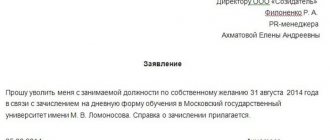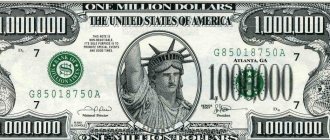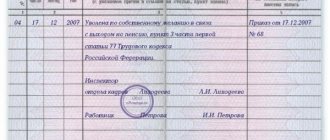The period of active search is the time when every person should feel like an ideal employee.
And, of course, the applicant is simply obliged to indicate in his resume, thought out to the last comma, precisely this quality of his: the ability to cope with any task not just well, but perfectly.
It is important for a potential employer to know what kind of person came for an interview. It is this necessity that dictates the rules for drawing up a resume, even on the simplest form, which will “sell” the applicant even to a strict personnel officer.
So what personal and business qualities should you include in your resume so that the interview doesn’t end with a rather dry “we’ll call you back”?
We sell personal qualities - we engage in self-promotion competently
Each person has a certain set of characteristics, which together make up the palette of his capabilities.
This is not just about professional skills - a specific specialization, additional skills or a willingness to master new areas of knowledge. All these characteristics are, of course, important, but personal qualities must also be present in the resume.
Therefore, a section of a resume that presents business and personal attributes can enhance an employer's perception of whether an individual will be able to handle the responsibilities of a particular position. And also how soon the hired employee will join the team.
“The employer cares not only about your professional skills, but also about your personal qualities.”
Don't be shy! Even at the highest level of specialization, it is never a bad idea to include your positive personal characteristics in your resume. The main thing is not to overdo it.
Only in a particular situation will such involuntary deception not affect the likelihood of being hired. For example, we are talking about the modeling business. Here, the applicant will not be required to ensure that the positive qualities indicated in the resume coincide with the real ones: it is the ideal appearance that is important.
Most common descriptions
To write a list of your strengths yourself, you need to be prepared to speak well about yourself. Many find it difficult to do this, so they try to find a ready-made example of personal qualities for a resume. But even in this case, you need to take the process seriously and select from the list only those characteristics that you meet.
Among the advantages can be named the following: honesty, ability to persuade, hard work, dedication, activity, friendliness, flexibility, sociability, resourcefulness, discipline, initiative, attentiveness, politeness, reliability, ability to work in a team, non-conflict, result orientation, punctuality, creativity , independence, self-criticism, desire for self-improvement, ability to adapt, enterprise, responsibility, creativity, efficiency, accuracy, developed analytical skills, knowledge of work algorithms, fairness, patience, integrity, decency, cheerfulness, determination, organizational skills, self-control, tactfulness and others.
Personnel officers advise entering no more than 5 qualities. It is important to select those that are most suitable for the chosen position.
Having decided which personal qualities to include in your resume, be prepared for the recruiter’s offer to talk about them in more detail and provide specific examples.
Good to know: Your achievements on your resume
We indicate personal characteristics: keep your eyes open!
What positive qualities cannot always be included in a resume? Conditionally positive qualities, for example, include the following list:
- Ability to take initiative. With initiative it is easiest to “outplay”. Management is not always kind to employees who come up with another new concept at every meeting. Sometimes it is important for a person to have a subtle sense of the limits within which he must act in order to bring maximum benefit to the organization through his work. An employee who constantly tries to bypass instructions (an overly proactive employee) is unlikely to stay long in a company with a conservative routine.
- Communication activity. Personal characteristics such as the ability to easily establish contact and the ability to negotiate with any counterparty are sometimes unnecessary information. In the eyes of a personnel officer who selects personnel for work that requires perseverance, the wording “contact” looks more attractive than “communication.”
- A little about punctuality. As a rule, such positive qualities in a resume as the ability to thoroughly carry out all the work according to the established algorithm and the ability to not be late for work are only welcome. In practice, it turns out that each of us ever deviates from such a valuable habit. Chronic delays of 2–5 minutes will lead to an undesirable effect on the part of the management of the company for which you wrote a resume and indicated “punctuality” in the “positive personal characteristics” column.
- Stress resistance and self-control. Also conditionally positive characteristics. With the ability to maintain composure in a difficult situation, a person’s qualities acquire a certain logical completeness, which overall looks quite attractive. But where is the guarantee that the boss also has these characteristics and never lashes out at his subordinates? Who can know whether the subordinate's self-control will be maintained in such a critical situation?
- Hard work, efficiency. Self-evident characteristics are unnecessary information. The applicant is hired to work. And period.
- Ability to learn new skills. A type of characteristic that, while not negative, is not always appropriate on a resume.
When to write: applicants applying for non-bureaucratic work - trade, R&D, etc.
When to write: show business, acting, PR - areas that require high communication skills.
When it’s worth pointing out: There’s definitely nothing wrong with it. Therefore, if this personal characteristic is truly inherent in the applicant, the employer has the right to find out about it.
It makes sense to indicate these traits if: the personal qualities in the resume really coincide with the personal qualities; the work does not require total control at every stage; the applicant is distinguished by increased persistence in achieving the goal.
There is no need to emphasize that the potential employee is going to fulfill his duties.
It is advisable to indicate this skill only to a young specialist or an applicant applying for a specific position.
Mistakes when writing a resume
When writing your resume, and in particular your “about” section, make sure that it does not contain any of the common mistakes listed below.
Typos and grammatical errors
Yes, this is probably the most obvious of all resume writing tips: it must be grammatically perfect. Even impressive work experience cannot smooth out the impression that was created by gross mistakes.
If you are not good at grammar, double-check what you wrote several times or ask a more literate person to check it. Agree, it is better to spend a little more time creating the perfect resume than to lose opportunities when searching for a job.
One resume for different positions
Whenever you try to create one generic resume to send to all job postings, you almost always end up with employers not being interested in you.
This approach usually says, “I'm not particularly interested in your company. Honestly, any job will do for me.”
Employers want to feel special and want a resume written specifically for them. They expect you to clearly demonstrate how and why you are qualified for a position in their specific organization.
Highlighting responsibilities instead of achievements
Your resume should show how well you do your job, but it's too easy to slip into list-off responsibilities mode. Employers are interested not so much in what you have done, but in what you have achieved in your work. They are looking for statements more like this image:
CV too short or too long
The reality is that everyone has different preferences and expectations when it comes to a resume, so you need to stick to the “golden mean.” You can usually limit yourself to a maximum of two pages. But don't get hung up on the number of pages. Your resume should fully reflect your experience and skills, but do not go too deep into their description.
Template description
A list of template phrases will not help you differentiate your candidacy from other applicants. Simply listing your skills won't tell an employer anything. Always try to support general words with specific examples.
Don't lose your sense of style
All positive characteristics, all personal qualities will undergo severe testing. The interview is not limited to reviewing the resume: the applicant will have to convince the personnel officer that all the listed qualities “have a place to be.”
If you indicated “loyalty and flexibility,” when asked about the reason for changing jobs, you should not recall grievances associated with the previous manager. It is better, instead of describing the deceit of the former boss, to modestly note:
- convenient location of the new office;
- higher salary;
- other neutral reasons.
An applicant who has indicated his learning ability must prepare for several tests. A quality that is valuable to an employer will be tested directly during the interview process.
This also applies to those who, when asked: “What strengths of yours will help you cope with the work we offer?” – he cheerfully declared his calmness and self-control. A psychologist on staff at the company will most likely suggest keeping such a balanced person in the waiting room for a couple of hours longer. Uncertainty and misunderstanding of the situation can throw many people off balance.
Examples of benefits for jobs that involve working with people
If you are looking for a position as a sales manager, teacher or PR specialist, then it is better to include the following personal qualities in your strengths: Communication skills, communication skills, public speaking skills, persuasive skills, self-confidence, presentable appearance, desire for self-improvement, stress resistance, ability to seek compromises and make decisions in non-standard situations, energy, sense of humor, punctuality, result orientation, resourcefulness, conscientiousness, responsibility, competent speech.
But you don’t need to list this entire list; choose the 5 that are most suitable for you. This characteristic will be able to show you from the best side. But keep in mind that if you have problems with constructing sentences or you start to stutter when you are nervous, then the specified point “oratory skills” will look like an ordinary lie.
Arriving on time for the interview will prove your punctuality, where you can demonstrate your sense of humor, if, of course, it is appropriate.
Advice from professional personnel officers
Focusing on the following advice from professional personnel officers, you can quite easily please your future bosses:
- The resume should be written in a discreet manner, and humor is inappropriate here. However, creative and creative positions may involve this.
- Copied, template resumes will not bring success, since personnel officers see such tricks right away.
- Five professional characteristics will be enough. Among them, stress resistance is always highly valued.
- You should indicate only the necessary qualities for the desired position.
- You need to answer questions only to the point. It won’t be possible to chat up the HR officer, but the impression of the applicant will be ruined.
In order to attract the attention of the employer, it is very important to think through all the points of the resume that relate to the personal qualities of the applicant. Correct completion of this document will guarantee your employment.
Originally posted 2018-03-29 05:50:00.
Examples of personal qualities for a resume
For your convenience, we have compiled examples of personal qualities for different professions. Don’t stupidly copy a list of other people’s qualities and assign them to yourself; be objective and write only what applies to you personally. It is enough to indicate five or six qualities that most accurately characterize you as a person and meet the requirements for the vacant position. For example, for creative areas creativity and good imagination are acceptable, and for technical areas – an analytical mind and attentiveness.
| Manager Administrator Accountant Engineer | Manager Teacher Seller Lawyer | Economist Driver Security Guard Secretary | Psychologist Educator Example of a man's personal qualities Example of a girl's personal qualities |
What qualities determine successful employees in candidates?
Whatever the business, its success is determined by the key people involved in it. Of course, each employer hopes to assemble the very team of professionals that will make their business effective, profitable and competitive. Perhaps many people believe that the personal characteristics that we indicate in a resume are of no interest to anyone, but these are precisely what employers evaluate first.
The larger and broader the company's activities, the more demands will be placed on employees. Typically, personnel selection in such companies is an individual and carefully prepared process. The willingness of many companies to train young professionals, of course, increases the chances of those who may not have the necessary experience and knowledge. But from the point of view of the corporate culture and values of the company, to the question of who the company wants to see on its team, the answer will be as follows: when assessing potential, the employer will primarily focus on the personal qualities of the future employee.
Naturally, everyone wants to find the so-called ideal candidates. Those that will at least 95% meet the requirements set by the company. But we all know very well that there are no ideal candidates, and therefore, when selecting, we mainly focus on the future , that is, the employee’s capabilities in the future, during adaptation and with certain training.
If we talk about the qualities that employers want to see in their future employees, they will definitely differ, depending on the needs of a particular business, position, tasks and functions - it will not be possible, as they say, to build everyone under one line. But still, there are certain qualities without which you simply cannot, and in any case, the company will pay attention to them.
Let's try to identify the most basic of them.
Punctuality, time management
Organizing and properly managing your time, at work or in life, is an important trait for any employee. Punctuality is what will primarily show your good or bad side. And rest assured, if you are late for an interview and did not warn that you are late, this will definitely reduce your chances of getting the job. Whatever the situation, if you realize that you don’t have time, try to warn your future employer about this, now there are many different means for this, and an excuse in the style of “I lost my number” will not work.
If you have already been scheduled for one meeting, and you are scheduled for the next one, you need to understand that you may not make it in time, it is better to reschedule it for another time or even another day. Plan your time correctly and with reserve, because it is better not to be late. Your ability to manage time will show the employer how quickly and timely you will complete tasks and whether you will meet the deadlines that are set for you.
Loyalty to the company
Interest in the future employer is one of the decisive factors. Every employer hopes that the candidate who comes to him for an interview wants to work for him. Not just because he needs to earn money and work, but because he believes and shares the company’s goals, is ready to offer his experience and knowledge, or, if the candidate has no experience, is ready to learn and make every effort to develop himself for the benefit of the company and for its success. Believe me, it's true. Therefore, when you go for an interview, find out more information about the company, its goals, mission, and achievements in the market.
Purposeful, result-oriented
A candidate’s ability to achieve set goals is probably the most important quality and comes first for most employers when choosing employees. In order to prove to the company that you have real experience in achieving goals, you can give an example of when you succeeded and what you did for it. But if you don't yet have professional experience, an example could be academic success or a story from your personal life. These do not have to be global goals. Finally, this could be an example that your goal is to get a job at this particular company where you came to the meeting. And you are ready to do anything to get this job. It is also worth mentioning your goals for the future, what you are striving for, and how you plan to achieve what you want.
Communication skills, ability to work in a team
Whatever one may say, when working in a company, communication plays an important role. Therefore, a respectful attitude towards corporate culture and the ability to establish effective communication with future colleagues, clients, partners, and managers are important for business. Your productivity and the efficiency of your work process and business as a whole will depend on how you can work in a team.
Stress resistance
The difficulties that each of us faces at work inevitably leads to constant stress. And how we deal with it determines our effectiveness. In order to test your level of stress resistance, a future employer can use a stress interview and, based on your reaction, determine your capabilities and readiness to work under pressure. This does not always mean that you will actually need to cope with stress at work every day, but the employer should know that in such situations you can cope and it will not unsettle you.
Flexibility, willingness to change
Business must develop; if this does not happen, it will not be able to be competitive. Development requires changes - in processes, perhaps in some of its directions, in human resources and much more. Of course, the employer hopes that employees will be understanding and willing to accept such changes. Therefore, when selecting employees, they will assess the ability to work in conditions of constant change. And this is not just the ability to adapt to new things, but also the ability to quickly make decisions, adapt to new conditions, learn new functions, participate in new projects, understand new business processes, work in a team with different departments, and perhaps even change partially the professional field.
Fast learner
Coming to a new job, one way or another, we still need training at the adaptation stage, no matter what level of specialist we are. This can be professional training in the specifics of working in a certain position for unskilled workers; usually companies provide it free of charge and it lasts from 2 weeks to one month. Quite a short period of time to learn the basics of a particular job, but at this stage the employer will evaluate the efforts and success of the new employee. But even if you came to the company as a ready-made specialist, you will need to train, since work processes are structured differently in each company. And your effectiveness and value as an employee depends on how quickly and efficiently you do this.
During the interview stage, companies may use a variety of tests and questions to test your learning abilities.
Commitment to development
If a specialist does not develop, his professional capabilities fall in value, and of course, his results in work decrease. Therefore, the desire to develop in the profession and improve your qualifications is important, even if you think that you know and can do everything. Technologies are changing, and as businesses strive to reach new heights, professionals must keep up with them. Therefore, during the interview, the question of what you are doing to develop as a specialist will definitely come up.
Honesty and integrity
The employer expects the future employee to perform his duties conscientiously. Therefore, these qualities are important not only for those who work with finance or material assets, but for all categories of employees. Honesty is important not only when performing one’s immediate duties, in relations with the employer, but also in interactions with colleagues. The company may request recommendations from a previous place of work, from a former manager or employees, use tests in the assessment, or conduct a Polygraph study - a lie detector.
This is not the entire list of qualities important for an employer; we tried to indicate the most significant ones and hope that this will help you when looking for a job.
Any reprinting of portal materials in electronic or paper media is possible only with the designation of the original source - .
Post your resume Add a vacancy









